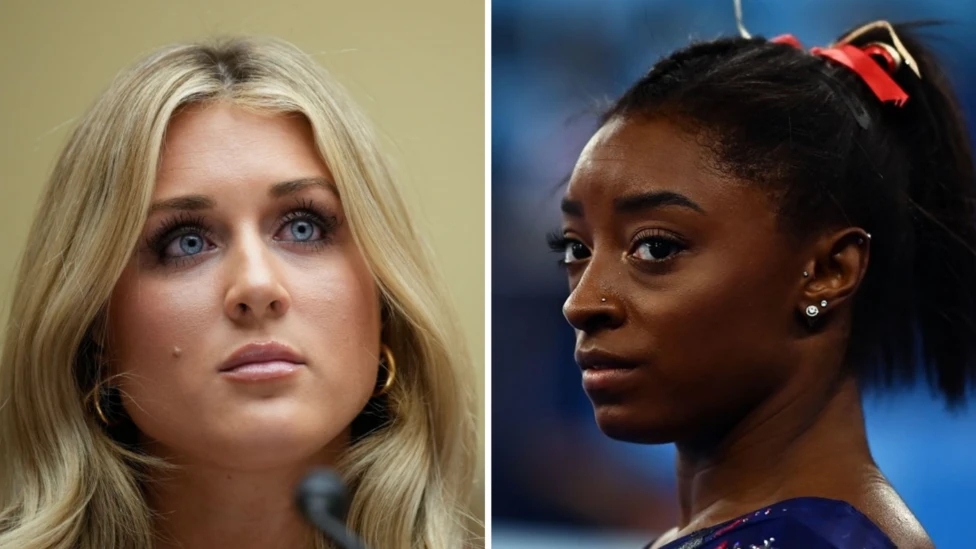Before that, Gaines mocked the Minnesota State High School League. She criticized them for deleting comments on a post about the Champlin Park girls’ state championship win.
Gaines often opposes policies supporting transgender athletes. This time was no different. But Biles pushed back. She defended inclusion and fairness with a clear, strong message.
Chaplin Park’s team includes a transgender woman player.
“You’re truly sick, all of this campaigning because you lost a race. Straight up sore loser,” Biles wrote on X.
Gaines tied for fifth place with transgender woman Lia Thomas in the 200m freestyle swimming at the 2022 NCAA Championships.
Later that year, World Aquatics voted to stop transgender women from competing in women’s elite races if they have gone through any part of the process of male puberty.
Thomas has since failed with a legal challenge to change the rules.
“You should be uplifting the trans community and perhaps finding a way to make sports inclusive OR creating a new avenue where trans feel safe in sports. Maybe a transgender category IN ALL sports,” continued Biles.
“But instead… You bully them… One thing’s for sure is no one in sports is safe with you around.”
Biles, a seven-time gold medallist, has been an outspoken campaigner for mental health awareness throughout her career.
She withdrew from the women’s team final at the Olympic Games in Tokyo in 2021, as well as four subsequent individual finals, in order to prioritise her mental health.
Gaines responded to Biles in follow-up posts, saying the gymnast’s stance was “so disappointing” and saying she should not be advocating for transgender women in women’s sport with her platform.
Since tying with Thomas in 2022, Gaines has said she felt “cheated, betrayed and violated”.
She has become an advocate for banning transgender women athletes from competing against women and girls.
In February, Gaines was present at the White House when United States President Donald Trump signed an executive order excluding transgender girls and women from competing in women’s sports.
In April, judges at the UK Supreme Court ruled that a woman is defined by biological sex under equalities law.
Since that ruling, a number of UK sporting bodies, including the Football Association and the England and Wales Cricket Board, have banned transgender women from playing in women’s sport.
Benifits of dating a transgender
1. Real Connection
Trans people often spend time exploring who they are. As a result, they deeply value honesty. They also believe in staying true to themselves—and to their partners.
2. Better Communication
Often, trans individuals focus on open and clear communication. Because of this, their relationships feel more honest and trusting.
3. New Perspective
Dating a trans person can give you a fresh view on life and identity. Therefore, you may grow in empathy and better understand others.
4. Inner Strength
Since many trans people face challenges, they build strong inner resilience. This can lead to deep loyalty, care, and emotional strength in relationships.
5. Support for Equality
When you date a trans person, you support fairness and inclusion. In addition, you help break down old stereotypes and uplift love in all forms.
Final Thought
In the end, every relationship is about mutual care and respect. Whether someone is trans or not, what matters most is how you treat each other—with kindness, love, and honesty.
Transgender stories: ‘People think we wake up and decide to be trans’
From a teenager whose mum joins him at Pride parades, to a 70-year-old who was sacked five times for being trans, five people tell of their experiences
Nikki Hayden, 26, psychology student, London
Until I was about four or five, I honestly didn’t know I wasn’t a girl. In fact, one of my earliest memories—around age five—was being yelled at by a teacher for going to the toilet with the girls. Around that same time, I began to realize I was different from the other boys.
By the age of nine, I refused to cut my hair. I simply couldn’t stand it. In fact, I didn’t get another haircut until I was sixteen, because the experience was always a torment.
School, meanwhile, was extremely difficult. I was bullied constantly. I was picked on for being too thin, for acting feminine, and for not liking football. Moreover, I was mocked for spending time with girls and for having long hair. In truth, they targeted everything they could—especially anything related to gender or sexuality.




